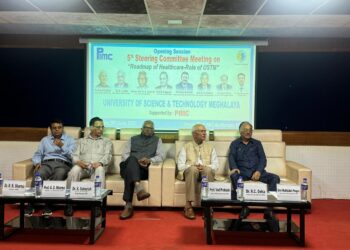GUWAHATI, 26th September 2023: Researchers at the Indian Institute of Technology Guwahati (IIT Guwahati) have developed a Silica Nanoparticles coated cotton fabric that can separate oil from oil-water mixture. This research aims to convert a large-scale agricultural waste into a sustainable value-added product to mitigate marine oil pollution. The said nanoparticles have been developed by utilising rice husk, an agricultural waste, as the primary source material. The findings of this study can aid in development of economical, sustainable platforms for separating oil/water mixtures or harmful components from aqueous/non-aqueous mixture.
Oil spills due to industrial discharge, or accidental mishap causes irreversible damage to the aquatic ecosystems. Conventional cleaning techniques such as skimming, or in-situ burning is ineffective, costly and causes additional pollution. Researchers around the world have been trying to develop energy efficient materials to separate the oil and water mixtures. However, the sustainable and economically viable conversion of biomass to modified silica for oil spill mitigation had not been explored earlier.
Explaining the eco-friendly method Prof. Vaibhav V. Goud, Department of Chemical Engineering, IIT Guwahati, said, “Our technology has multiple beneficial effects on the environment. Rice husk is an agricultural byproduct, rich in silica that is generated in millions of tons every year. It generally ends up being burnt unscientifically causing air pollution. With our technique this waste rice husk is converted to 3D sorbents that mitigates oil contamination by following a selective active-filtration process.”
In this process, inexpensive agricultural-waste, rice husk is gradually heated and efficiently converted to charcoal also known as bio-char. Subsequently, this bio-char is subjected to further heating to transform it to silica nanoparticles. The size of these nanoparticles can be customized by adjusting the pH of the bio-char. To render the nanoparticles water-repellent, they are treated with special chemicals known as silanes. Finally these treated nanoparticles are coated over a cotton material creating a natural, three-dimensional sorbent for separating oil-water mixture.
Explaining the significance of their work, Prof. Goud, said, ”Our experiments at IIT Guwahati have demonstrated that the coated cotton fabric particularly adsorbed oil, while the uncoated sample adsorbed both oil and water. The developed superhydrophobic material has shown a remarkable 98% efficiency and retained its functionality even after repeated use and exposure to harsh environments.“
The details of the natural 3D oil absorbing material have been published in the prestigious international journal Biomass and Bioenergy. The paper has been co-authored by Prof Vaibhav V. Goud and his research scholar Ms Sutapa Das.
###
ABOUT IIT GUWAHATI
Indian Institute of Technology Guwahati, established in 1994, completed 25 years of glorious existence in 2019. At present, the Institute has eleven departments, nine interdisciplinary academic centres and five schools covering all the major engineering, science, healthcare, management, and humanities disciplines, offering BTech, BDes, BSc(Hons), MA, MDes, MTech, MSc, MS(R), MBA and PhD programmes. The institute offers a residential campus to 439 faculty members and more than 8,600 students at present.
IIT Guwahati has retained the 7th position among the best engineering institutions of the country and 9th position in both ‘Overall’ and ‘Research’ Categories in the ‘India Rankings 2023’ declared by the National Institutional Ranking Framework (NIRF) of the Union Ministry of Education.
IIT Guwahati has achieved rank 6 in the SDG 7 (Affordable and clean energy) globally in the Times Higher Education (THE) Impact Rankings 2023 and is the only academic institution in India that occupied a place among the top 100 world universities – under 50 years of age – ranked by London-based Times Higher Education (THE) in 2014 and continues to maintain its superior position even today in various International Rankings. IIT Guwahati gained rank 32 globally in the ‘Research Citations per Faculty’ category and overall 364 rank in the QS World University Rankings 2024.
Among other frontier areas of research and innovation, IIT Guwahati is working towards augmenting critical science research initiatives in Genomics, Developmental Biology, Health Care and Bioinformatics and Flexible Electronics, among numerous other areas.









